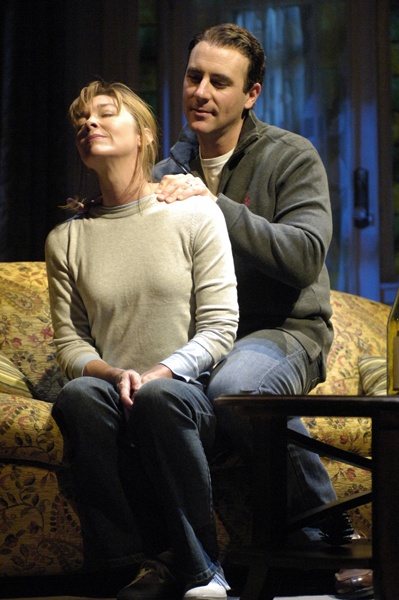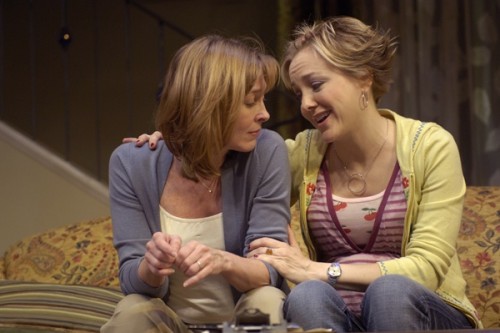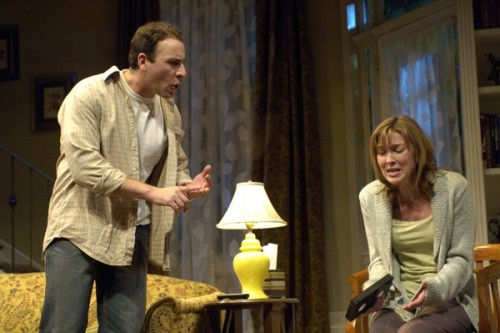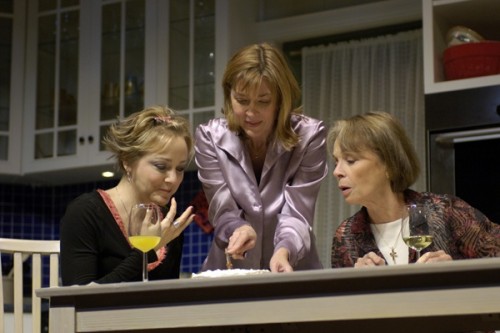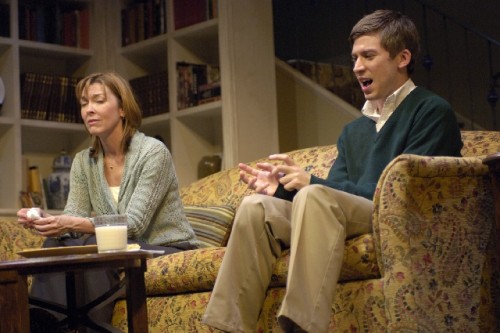Rabbit Hole at Huntington Theatre
The Eat Me Drink Me of Grief
By: Charles Giuliano - Nov 10, 2006
Rabbit Hole
Play by David Lindsay-Abaire
Directed by John Tillinger. Sets, James Noone. Costumes, Laurie Churba. Lights, Dennis Parichy, Music and Sound, John Gromada.
Cast: Becca, Dinna Bullock, Izzy,
The Huntington Theatre Company
Through December 3
617 266 0800
http://www.huntingtontheatre.org
Having garnered five Tony awards during its prior run on Broadway the two act, two hour long play "Rabbit Hole" by David Lindsay-Abaire, opened to great anticipation for its
The play provided an evening of theatre that lingers and is deeply moving on many levels but not enough so to cross over into the realm of greatness or a firm niche in the canon of contemporary theatre. Arguably the circumstances while horrific in their impact occur to such a paradigmatically ordinary suburban family that it is difficult to find anything significantly compelling about these individuals. Were it not for the tragic circumstance they are working through there is nothing interesting about the lives and characters of these exemplars of
It is curious that the playwright David Lindsay-Abaire was deliberate in crafting the characters in such a plain and straightforward manner. As the evening progresses we learn of no deep dark secrets but rather of a very average couple who had their lives impacted when the son pursued the dog out into the street and was struck down by a guilt ridden teenager, Jason (Troy Deutsch) who is earnestly seeking closure with the family.
So it is the mundane and ordinary that is both the strength and weakness of the play. This is aptly reflected in the superbly crafted sets by James Noone which all too effectively convey the numbing vacuity of a middle class Larchmont home. The kitchen reads like a spread in House Beautiful and you find yourself looking for decorator tips, like the attractive use of tile around the sink area. You expect at any moment for Martha Stewart to tell us that she is focusing on making her salad.
But it is precisely this ordinary, enervating aspect of the characters and setting that is so attractive to a broad segment of theatre goers. It could all so easily be a family tragedy set in their own suburban home. In this sense the play has a broad and compelling reach as it is a tragedy that could happen to any family and we get to see how folks just like us, or the majority of theatre goers, work through resolving the issues. The precise circumstances may differ but there is a broad commonality that has us conflating our own histories just as the tragedy unfolds before us.
The play begins in the kitchen with the free spirited Izzy, Geneva Carr, visiting her more solid and substantial older sister Becca, Dinna Bullock, who is in the process of folding and packing away a box of children's clothes. In the ensuing exchange we learn that Izzy is pregnant by a "musician." There are moments of laughter and a kind of guilty pleasure of humor that threads through this tragic comedy. We come to laugh and cry as would be all too true of any family and its absurd circumstance. Don't we all make jokes at the reception following a burial of the dear departed. Sharing the humor is a part of grieving and the author injects that with nice timing and care. Becca on learning this is both concerned as her sister has no resources for paternity as well as too quick in offering the clothes. But there is the issue of the gender of the baby as well as the resistance to taking charity and hand me downs.
After eight months of grieving Becca wants to pack away Danny's things and even to sell the house as she conveys in an emotional outburst to her seemingly stolid husband,
But he wants to move on in another way and attempts to seduce her in what starts as comic and ends as a tragic scene. There is the amusing process as he plies her with wine, dims the lights, and puts on mood music which we recognize as Al Green and "Let's Stay Together." She puts the brakes on to love making while he asks poignantly just what is wrong with wanting to make love with his wife? And that, after all, it has been eight months. To which she retorts so are you keeping track. It is a tough but all too familiar domestic signifier of marital conflict.
There is a botched birthday party for Izzy that introduces Mom, Nat, Maureen Anderman, but her character actually has a minor impact on the balance of the play. She is underwritten to the point of afterthought. Nat is designed as the fulcrum in the struggles between the very different sisters but there is just not enough depth to make a difference. The decision is made to sell the house and Izzy strongly advises clearing out Danny's room so we see Nat helping Becca in that difficult task of what to save and what to toss.
During the "open house" Jason arrives and is rudely rejected by Howie but not before the teenager manages to leave his phone number and a plea to meet with the family. It turns out that he writes fiction and is about to have a piece published. He requests permission to dedicate it to Danny. Later Becca does contact him and in the best scene of the play they have a polite but tense meeting. Just like a suburban housewife she wants to feed him. Fresh made lemon square. And milk. He eats it awkwardly but politely. In discussing the fiction piece he describes the notion of parallel universes where all of our characters and circumstances exist simultaneously somewhere else. Down the Rabbit Hole of our imagination to a place where Danny still exists and did not run in front of Jason's car.
Later Howie comes home to learn of the visit that he clearly was not ready or willing to participate in. The evening ends on this understated note of their reaching some kind of closure. As any family which has grieved the loss of a child knows there is no resolution of the pain and suffering. But we all struggle to find a way to move on. Some do and many don't. Here the playwright has opted to keep it simple. As the curtain came down one could sense a sigh of relief in the audience. We had been let off the hook so to speak and could leave to pick up the thread of our own lives.

